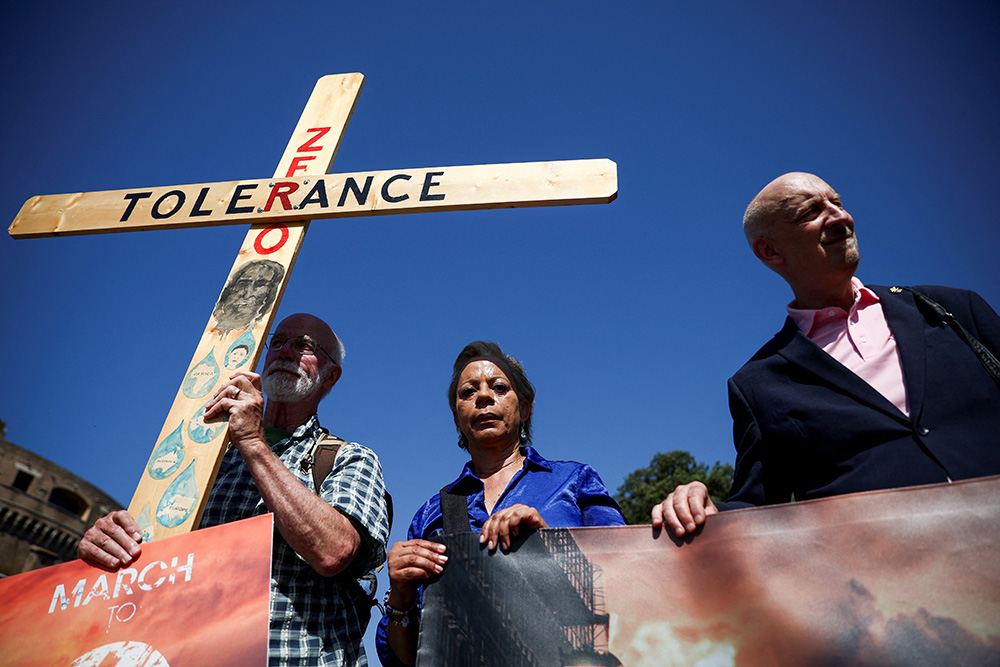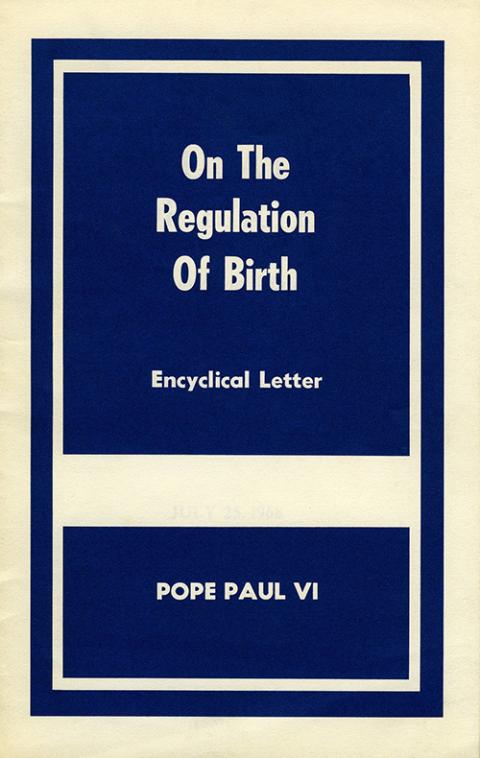
(Dreamstime/Patcharin Simalhek)
In 1968, Pope St. Paul VI promulgated the encyclical letter Humanae Vitae, closing the discussion about whether the Roman Catholic Church should revise its stance on birth control. Paul offered several reasons for reiterating the church's long-standing prohibition, one being that, in his opinion, the use of contraception would lead to the depersonalization of women.
The document states, "A man who grows accustomed to the use of contraceptive methods may forget the reverence due to a woman, and, disregarding her physical and emotional equilibrium, reduce her to being a mere instrument for the satisfaction of his own desires, no longer considering her as his partner whom he should surround with care and affection."
Today, conservative Catholics frequently reference Paul VI's prognostications in an attempt to connect sexual abuse and misconduct with the phenomenon of contraceptive use.
In July 2018, the National Catholic Register published a blog post by Janet Morana, titled "50 Years Ago, Pope Paul VI Predicted #MeToo." Morana argues that widespread contraceptive use is the real culprit behind the exploitation of women in the entertainment industry.
In April 2023, Laura Perrins wrote a piece for the Catholic Herald in the U.K.: "Pope Paul VI was right about The Pill — now everyone else is finally catching up." Perrins refers to several feminist writers' discussions of the ethical and health issues associated with some contraceptives, and concludes that "even the secular world is beginning to understand the problem with The Pill that the Vatican highlighted all those years ago."
Recently, in January 2024, a piece by Msgr. Owen Campion, published in Our Sunday Visitor, provoked a stir among progressive Catholics on Twitter (X). In his article, titled "Paul VI was right about the dangers of birth control," Campion takes the fashion for tying sexual immorality to contraception a step further.
Referencing the clergy abuse crisis, Campion writes, "Maybe a link exists among all cases and among related social concerns: this generation's 'anything goes' philosophy regarding intimacy and relationships."
Campion doesn't quite assert that contraceptive use caused the clergy abuse crisis, but he hints at it strongly, writing, "Modern society, by falling into what [Paul VI] forecast, is reaping the whirlwind. He was right. He saw artificial birth control as indicating something broader and deeper. People are losing sight of the correct purpose of intimacy."
The best that can be said about such theories is that they are impressive exercises in naiveté. Perhaps Paul VI was unaware, when he wrote Humanae Vitae, that the dire abuses and dysfunctions he predicted had already been around for millennia. And perhaps the writers who pen articles asserting that "Paul VI warned us," are similarly sheltered.

Pope Paul VI at the Vatican on June 29, 1968 (CNS files)
Despite romantic fantasies about a better, nobler past, for most of history there was no expectation that men would treat women with basic respect, let alone "reverence." In the Hebrew Scriptures and the Homeric epics, men renowned for honor and heroism casually treat women as objects to be used and discarded. The practice of polygamy, widespread in many cultures in the past, allowed men to utilize women as toys for pleasure or tools for breeding.
Though the early church offered a blueprint for radical gender equality and respect for the dignity of the person, Christian civilizations replicated the gender biases and other injustices of pre-Christian societies.
Consider that chattel slavery, which involved kidnapping, trafficking, abuse and rape of women and girls, continued unchecked in Christendom for centuries. The Catholic church couldn't bring itself to condemn slavery absolutely until 1993, undermining the popular claim that the church is the best defender of the vulnerable and reminding us that the magisterial authorities have been wrong before.
While enslaved women were subjected to some of the worst horrors, this doesn't mean others were safe from sexual abuse and violence. The phenomenon of women being coerced or forced into arranged marriages is one indicator that society had scant respect for a woman's bodily autonomy.
Advertisement
And for much of history, the concept of marital rape did not exist. Once a man and a woman were married, it was understood that they owed one another a "marital debt." Not until July 1993 was marital rape made illegal across the U.S. — and there are still certain loopholes and exemptions for men in some states.
Subjugation of women was real, not a feminist myth. It is blazoned all over historical documents, art, literature, legal texts and political theory. Male supremacy was enshrined in laws barring women from inheriting or holding property, as well as trends and customs of forbidding women from holding jobs, attaining political office or pursuing an education.
In addition, social and racial hierarchies meant that even if a society revered a few select women, others were deemed less worthy, or even unworthy, of protection.
In the case of clergy abuse, since a majority of cases involve male victims, many conservative commentators like to place the blame on acceptance of LGBTQ+ people, or even a supposed "infiltration" of the priesthood. But clergy abuse has also been around for centuries. And though many cases don't involve women victims, they do involve privileged men who feel entitled to use others.

Advocates for zero tolerance of clergy sexual abuse attend a march with survivors of clergy sexual abuse and activists near the Vatican in Rome Sept. 27, 2023. (OSV News/Reuters/Guglielmo Mangiapane)
This points to a broader disposition to give preference to the wealthy, powerful and dominant, in direct violation of the "preferential option for the vulnerable" at the heart of the Gospel.
Abuse of young people by older religious leaders may not be a symptom of the patriarchy per se, but it is absolutely a symptom of a civilization that rejects justice and equality in favor of dominance hierarchies. Even today, victims of powerful predators are often afraid to say anything. They know the systems are rigged against them.
Long before contraceptive use became mainstream, women entering marriage knew they had no guarantee that their partners would prioritize their physical and emotional well-being, or even treat them with compassion and consideration. If anything, increased access to birth control offered women some relief from some of the burdens that a patriarchal culture placed on them.
Rape culture is nothing new. Sexual abuse of minors by powerful religious leaders is nothing new. Women and young people have been abused, coerced and assaulted for centuries.
Maybe it's not the feminists who need to catch up with Humanae Vitae. Maybe it's time for the church's institutional leaders to catch up with the feminists.
What is new is that survivors are finally feeling empowered and supported enough to take a stand, not only against the individuals who prey on the vulnerable, but against the systems that enable this.
Cultural analysts should know this. If they ignore history and attempt to pin the blame for sexual violence on anything so recent as access to effective birth control, they either haven't educated themselves sufficiently, or aren't arguing in good faith.
Yes, as feminists have been pointing out for decades, there are ethical issues associated with birth control. The same misogynistic, racist, classist and colonialist sins that existed in the past still influence gender relations and expectations.
Contraceptive methods as they exist today do place unequal burdens on women. In a capitalist society that only values profitable productivity and treats reproductive capacities as a problem to be solved, women may be coerced to use birth control. And these injustices are exacerbated for women in less advantaged demographics.

Posters are hoisted in St. Peter's Square by a group of persons favoring artificial birth control, as Pope Paul VI appears at the central balcony of St. Peter's Basilica to read his Easter message to the world and impart his "urbi et orbi" blessing March 26, 1967. (AP)
Contrary to what Campion and others seem to think, many in our current generation have the opposite of an "anything goes" approach to sex and relationships. It's not the 1960s anymore. Young people, both religious and otherwise, tend to be serious about such ethical issues as consent, care for the other and respect for boundaries. Ironically, the people who often seem least invested in these issues are not secular feminists but rather religious traditionalists.
So maybe it's not the feminists who need to catch up with Humanae Vitae. Maybe it's time for the church's institutional leaders to catch up with the feminists.
For Catholics, these discussions have an added dimension, because they involve questions about obedience to institutional teaching and the primacy of conscience.
Many Catholic women have been grappling seriously with Paul VI's prohibitions in Humanae Vitae. For instance, what should we make of the fact that the pope reinforced the ban on birth control against the advice of the commission of bishops, priests, theologians, scientists and laypeople who spent two years deliberating the issue? Was this a radical failure of synodality and discernment on his part? Should this be added to the long list of instances where the church's institutional leadership got it wrong and needs to reassess?
One thing at least should be clear. The church's hierarchy needs to take ownership of their own grave moral failings, especially in the realm of sexual ethics. Until they do so, they can hardly expect to be taken seriously.









